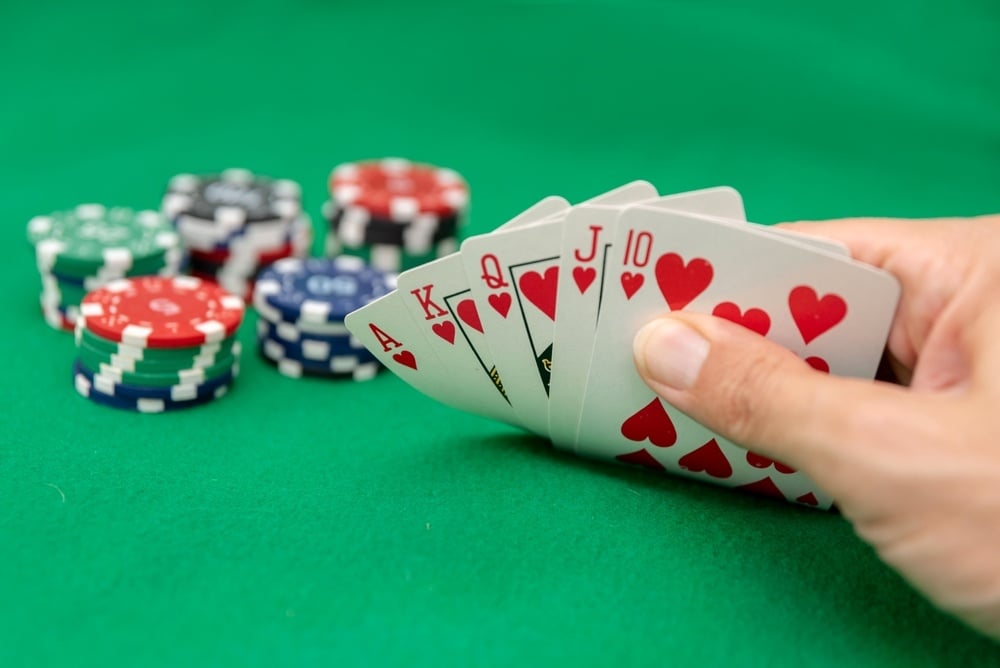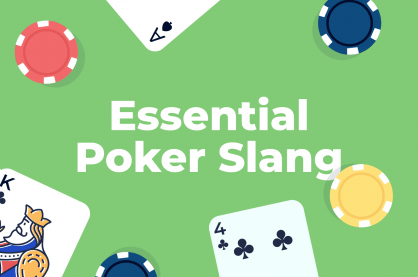Poker Hand Odds Explained

Poker Hand Odds: What You Need to Know
- Importance of Hand Odds: Learn why understanding hand odds is an essential part of a successful poker strategy, giving you insight into probability and decision-making.
- Computing Hand Odds: Understand how to calculate hand odds based on the number of outs and the number of unseen cards.
- Applying Hand Odds: Utilize your grasp of hand odds to decide whether to fold, call or raise in particular situations.
- Hand Odds in Different Poker Games: Explore how hand odds can differ across various poker games and variations (e.g., Hold’Em, Omaha).
- Practice and Patience: While calculating hand odds is mathematical, be patient with yourself as mastery comes from continuous practice and real game experiences.
Understanding Poker Hand Odds
Every poker player should have a strong understanding of poker hand odds. Knowing the probability of getting dealt certain hands or making hands like flushes and straights gives you an edge over players who don’t understand this basic poker math.
Our comprehensive guide to poker odds will teach you what your odds are in different situations and how they are calculated. Keep on reading and become an expert on poker hand odds in just a few minutes.
What Are Poker Hand Odds?
Poker hand odds, or simply poker odds, are a mathematical representation of making a certain hand. For example, imagine you hold a hand with two spades, and there are two more spades on the flop. You are looking to make a flush, but how likely is that to happen?
Poker odds can give you a very precise answer, and it’s simpler than you might expect.
Since there are exactly 52 cards in the deck, and an exact number of cards gets dealt, knowing the probability of a certain card coming is as simple as doing basic counting and division. But before you learn how to calculate your odds, let’s take a look at some basic poker probabilities.
Basic Poker Probabilities
Before we get into the nitty gritty of calculating poker hand odds, we can take a look at how probability works in some common spots in poker. Here is a look at the basic probabilities of various events that can happen at a poker table that might be of note:
- Odds of getting dealt AA (or any other pocket pair): 220:1 – 0.45%
- Odds of getting dealt a pocket pair: 16:1 – 6.25%
- Odds of getting dealt AK: 81.9:1 – 1.22%
- Odds of getting dealt suited connectors: 24.5:1 – 4.08%
- Odds of flopping a flush: 118:1 – 0.85%
- Odds of flopping a pair: 2.45:1 – 40.8%
- Odds of a rainbow flop: 1.51:1 – 66.23%
- Odds of two pair on the board: 95.4:1 – 1.05%
As you can see, there is a number that can be put to any situation you see at the poker tables. How you calculate such numbers and what they depend on is something we will learn in this guide.

The Importance of Learning Poker Odds
Whatever you may have learned about poker up to this point, we are here to teach you that you can’t win at poker without math. A strong understanding of the basic mathematical principles of poker is the only way to become a truly great player.
Poker odds are at the very center of poker math. Whether you are trying to figure out if your hand is good or how likely you are to improve, calculating your odds is essential. This is why mastering the concepts introduced in this guide is a key first step to poker greatness.
Skill vs. Luck in Poker
One of the biggest reasons that poker is a game that can be beaten is the fact so many poker players think it’s all about luck. Such players play their cards with the hopes of getting “lucky” and making the best hand. In the long run, such a strategy is destined to hit a brick wall.
Serious poker players, on the other hand, understand poker is all about skill. The skill in poker manifests in many ways. One of the key ways that knowledgeable players win consistently is through the application of poker math. If you can understand basic odds better than your opponents, you will already have a significant edge against them.
Strategic Advantages of Knowing the Odds
So, how exactly can knowing the odds of different poker hands help you? Well, there are quite a few ways.
For example, imagine you are facing a bet on the turn with a straight draw. If you know the odds of making that straight, you will be able to calculate whether you can make the call profitably. If you don’t know the odds, all you can do is guess and hope.
Similarly, imagine facing a big river bet from your opponent with a medium-strength hand. If you have a good grasp of poker mathematics, you will be able to estimate the likelihood your opponent is bluffing. If you don’t, all you can do is close your eyes, stick the chips in, and hope you are good.
Calculating Poker Hand Odds
Now that we have discussed why poker hand odds are important, it’s time to learn how to calculate them. There are two solid ways to calculate your odds. One of them involves using poker odds calculators, and the other one allows you to calculate your odds on the spot without any tools.
If you want to get the exact numbers, using an odds calculator will be almost inevitable for a while. On the other hand, the manual method can easily help you figure out your odds without any external tools.
How to Calculate Odds in Poker
Whenever you have a hand you don’t believe is best at a certain point in a hand, you will want to calculate the odds of improving to a better poker hand.
For example, if you are holding 9s8s on a board of As7d4s and face a bet, you know your hand is probably not good. But if you make your flush, your hand will win the pot more often than not.
So, how do you know how often you will win? Well, it’s actually pretty simple. You know several things that will help you calculate the poker hand odds:
- There are 52 cards in the deck
- There are 12 spades in the deck
- Five cards are accounted for
- Four spades are accounted for
Based on these simple facts, you now know that there are 9 remaining spades in the deck, and there is a total of 47 cards that have not been accounted for. Since you have only seen the three cards on the flop and your two hole cards, any of the remaining 47 cards could be spades.
Therefore, your odds to improve on the turn are 9/47 = 0.19 or 19%. Since there are still two cards to come, you can double that number and get 38%, which is the approximate chance you have of improving to a flush.
An alternative way of coming up with this same solution is to put your hand into one of the free poker odds calculators out there. These calculators will also reveal your odds.

Using “Outs” to Determine Odds
In the example above, we explained that nine remaining spades improve your hand. These nine cards are called “outs.” The concept of poker outs can be used in any situation when you are drawing to a better hand.
Whether you have a flush draw, a straight draw, or simply two overcards to the board, you can count out your outs and use that to calculate your poker odds.
The formula above always holds, as dividing the number of outs by the number of remaining cards in the deck unmistakably produces your poker hand odds.
Common Poker Odds and FAQs
The calculation we described above is the only exact way to calculate your poker odds. However, doing this calculation every time you are faced with a decision can be tedious. The best way to approach playing poker is to know the most basic poker odds by heart.
Fortunately, you can easily memorize the odds of most common poker hands in just a few minutes.
What Are the Odds of Different Poker Hands?
Here is a look at the basic poker odds you will have to improve your hand in some common poker scenarios:
| Poker Hand | Total Outs | Odds on Flop | Odds on Turn |
| Open-ended straight flush draw | 15 | 54% | 33% |
| Gutshot straight flush draw | 12 | 45% | 26% |
| Flush draw | 9 | 36% | 20% |
| Open-ended straight draw | 8 | 32% | 17% |
| Two overcards | 6 | 24% | 13% |
| Gutshot straight draw | 4 | 16% | 9% |
| One overcard | 3 | 12% | 6% |
Rule of 4 and 2 in Poker Explained
We have now looked at a few ways to calculate your poker odds. Yet, there is another very fast way to calculate your odds very quickly. This method is called the rule of 4 and 2, and it involves the simplest multiplication possible.
Whenever you are trying to calculate your poker odds, count out your outs first. If you are on the flop, multiply the number of outs by four. If you are on the turn, multiply the number of outs by two. The number you come up with will come very close to your real odds.
For example, if you have nine outs and multiply by four and two, the numbers you come up with are 36 and 18. A glance at the table above shows that the actual numbers are 36% and 20%, which is very close to the result you get by using the rule of 4 and 2.
One thing to keep in mind is that as the number of outs goes up, the calculation will be less and less correct. At a higher number of outs, multiplying by 4 on the flop will give you slightly exaggerated odds, while multiplying by 2 on the turn will give you slightly lower odds than the real ones.
Still, if you do the simple calculation and rely on those numbers, you will be very close to the real mathematical solution in just a couple of seconds.

Practical Application of Poker Odds
You have learned how to calculate your poker odds, but how do you put that knowledge to use? There are quite a few situations when knowing the odds is the thing that can give you an edge and allow you to improve your strategy. Let’s take a look at a few.
Best Strategies for Different Poker Hands
The best strategy to use in any given poker situation depends on a number of factors. These include the poker hand odds, which can be leveraged in different ways.
For example, imagine you are playing a poker hand where you flop an open-ended straight flush draw. With 15 outs to improve, you face a bet from your opponent. While your hand is not strong at the moment, you know you have 54% equity, thanks to the calculations we learned earlier.
This knowledge allows you to play aggressively and put in a raise instead of just calling. By raising, you can force your opponent to fold strong hands, increasing your overall equity in the hand even more.
In contrast, imagine having a strong hand on a board with many draws. In a spot like this, you can calculate how much equity your opponent might have with his different hands. With this knowledge, you can increase the size of your bets to price them out or make them difficult to call.
By setting the right price, you can make your hand more profitable and increase your expected value.
Using Odds to Improve Gameplay
Poker odds play an essential role in the overall poker strategy of any strong player. By understanding the math behind the game, you will be able to adjust your gameplay and make plays that other players simply don’t understand.
Some examples of poker odds helping you improve gameplay include:
- Knowing when to fold a draw
- Knowing when to fold a made hand
- Knowing when to make a big bet
- Knowing when to bet small for value
- Knowing when to go all-in as a bluff
All of these plays, and many others, can be made thanks to a proper understanding of poker odds. However, don’t expect to be a master of poker odds right away, and allow yourself time and practice to reach perfection.
Tools and Resources for Calculating Poker Odds
You have learned a few ways to calculate your poker probability without using any tools. However, when you are not playing, you can use tools to get your results even quicker and more accurately. The best tools for calculating probability in poker are poker odds calculators, whose only function is to tell you the odds of your poker hand.
The Best Poker Odds Calculators
If you are looking for a good poker odds calculator to use, here is a look at a few popular tools:
- MyPokerCoaching Poker Odds Calculator
- Poker News Poker Odds Calculator
- 888poker Texas Hold’em Odds Calculator
- CardsChat Odds Calculator Online
Can You Use a Poker Odds Calculator While Playing Online?
While you can technically use a poker odds calculator while playing online poker, you should not. Using such tools while playing can be considered “real-time assistance” (RTA) and is forbidden by the rules of all major poker sites these days.
If you are planning on playing online poker, we highly recommend learning how to calculate your poker odds without a calculator. Feel free to use calculators while studying the game, but not while playing online poker.


